| Buchhandlung Heesen | Versandbuchhandlung für Evangelische Theologie |
Impressum | |
| Freudenstadt / Loßburg | Datenschutzhinweise | ||
| Tel. 07446 952 418 1 | Buchhandlung.Heesen@t-online.de | ||
| Da unsere Angebote manuell erstellt werden und während des Seitenaufrufes keine Verbindung zu einer Buchdatenbank aufgebaut wird prüfen wir die Verkaufspreise bei Rechnungsstellung auf Richtigkeit und berechnen den gesetzlich festgelegten Buchpreis. Falls sich dadurch eine Preiserhöhung ergibt werden wir Sie vor Versand informieren, Sie können dann diesem Preis zustimmen oder vom Kauf zurücktreten. Hinweise zum Datenschutz und Cookies | |||
| Law and Religion in the Early Modern Period / Recht und Religion in der Frühen Neuzeit | ||
|
Reihenherausgeber:innen: Herman J. Selderhuis und Wim Decock Das Verhältnis von Recht und Religion hat sich in den letzten Jahren zu einem der Kernthemen der Forschung zur Frühen Neuzeit entwickelt. Eine wachsende Zahl von Monographien sowie Forschungsprojekte zur Rechtsgeschichte, Theologie, Philosophie, Ökonomie und Kunst belegen diese Entwicklung. Mit dieser neuen Reihe soll der interdisziplinäre und interkonfessionelle Dialog über Recht und Religion in der Frühen Neuzeit gefördert werden. Sie wird von international anerkannten Wissenschaftlern herausgegeben und von RefoRC-Mitgliedern wie der Universität Leuven und der Leucorea Stiftung Wittenberg unterstützt. Die Publikationssprachen sind Englisch und Deutsch. Die Redaktion begrüßt ausdrücklich die englische Übersetzung herausragender Werke, die ursprünglich in anderen Sprachen veröffentlicht wurden. |
||
 |
Christoph Haar Slavery, Law and Religion in the Early Modern Period Ferdinand Schöningh, 2024, 250 Seiten, Hardcover, 978-3-506-79632-5 129,00 EUR |
Law and Religion in
the Early Modern Period / Recht und Religion in der Frühen Neuzeit
Band 7 English: This book examines enslavement, slavery and the global slave trade through the lens of law and religion in the period c. 1500-1800, revealing the discursive and practical contexts in which relations of slavery appeared across different settings around the globe. The volume adds to current research trends in the historical disciplines by incorporating underexamined geographical areas, by drawing on conceptual work on the meaning of slavery and by supporting interdisciplinary scholarship. Approaches from cultural, intellectual, religious and legal history feature in this volume and enter into conversation. Moreover, the individual chapters move across time and space, inviting the reader to consider the spectrum of slaveries in the early modern world. One key theme throughout the volume lies in taking up the perspectives of law and religion to analyse how local cultural settings as well as semantic appropriations shaped relations of slavery. |
 |
Maria Madalena Brito The Slave is a Human Person Ferdinand Schöningh, 2024, 400 Seiten, Hardcover, 978-3-506-79486-4 138,00 EUR |
Law and Religion in
the Early Modern Period / Recht und Religion in der Frühen Neuzeit
Band 6 English: Fernão Pérez’s "De restitutione" and the Debate on Slavery in Early Modern Portugal With the edition, translation and study of a 16th century moral theology treatise, Maria Madalena Brito shows how this discipline was the area par excellence for critical debate on slavery in Portugal at this time. This was substantial in comparison with what occurred in other areas of Portuguese culture. Any questioning of slavery then involved enormous theoretical and practical complexity as there was a conflict between what was ideal at the level of conscience and what was felt at the time as a condition for the economic prosperity of an entire empire. Neither Fernão Pérez nor other Professors in Portugal condemned slavery in absolute terms. However, Pérez and other theologians approached sensitive subjects, suggesting the limitation of slave trade, denouncing situations of injustice and violence towards the slave, demanding restitution of freedom to slaves who were not so by just title. They stressed the humanity of the slave based on their Christian conscience and on classical principles of natural law. Blick ins Buch |
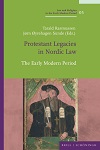 |
Tarald Rasmussen Protestant Legacies in Nordic Law The Early Modern Period. Schöningh, 2023, 280 Seiten, Hardcover, 978-3-506-79074-3 118,00 EUR |
Law and Religion in
the Early Modern Period / Recht und Religion in der Frühen Neuzeit
Band 5 English: The overarching goal of the book is to examine the relations between Lutheran majority traditions and the development of secular law in the Nordic region in the early modern period, from the 16th to the 18th century. The early modern Nordic region included the kingdoms of Denmark/Norway and Sweden – with the Finnish diocese Åbo as part of the Swedish realm. Both kingdoms were consolidated as Lutheran countries after the reformation. While this change occurred in a determined and radical way in Denmark, in Sweden the transformation was more hesitant. Due to its mixed Protestant (Lutheran/Calvinist) and Roman-Catholic heritage, case studies dealing with Germany offer interesting comparative perspectives. Integral to the project is the awareness of tensions between different religious, legal and philosophical traditions in the interface between majority/minority/equality positions, including Protestant minority movements and the Eastern-Orthodox church. The authors are experts in church history and legal history from Germany, Belgium, Denmark, Sweden, Finland, and Norway. Blick ins Buch |
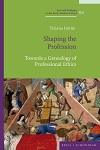 |
Tiziana Faitini Shaping the Profession Schöningh, 2023, 340 Seiten, Hardcover, 978-3-506-79019-4 118,00 EUR |
Law and Religion in
the Early Modern Period / Recht und Religion in der Frühen Neuzeit
Band 4 Towards a Genealogy of Professional Ethics. English: The figure of the “professional” looms large in our contemporary society as an ideal for economic activity and socio-political inclusion, and even as a model for individual self-development. But how and when did this figure arise? And what has led professional activity to become such an essential part of our personal, social, moral, economic, and political life? While Max Weber and others have famously addressed these questions, this book reveals a more nuanced history of the concept of “profession” and “professional duty,” and offers the first comprehensive study of the discourse of professional ethics from a historical perspective. Italy, France, Germany, and the United Kingdom provide most of the rich corpus of philosophical, juridical, and theological sources discussed throughout the book in its longue durée journey from Ancient Rome to the present. |
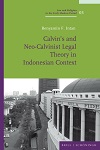 |
Benyamin F. Intan Calvin’s and Neo-Calvinist Legal Theory in Indonesian Context Schöningh, 2023, 200 Seiten, Hardcover, 978-3-506-79050-7 109,00 EUR |
Law and Religion in
the Early Modern Period / Recht und Religion in der Frühen Neuzeit
Band 3 English: The heightened role of religion in the public sphere can become either a source of violence or a source of reconciliation. Considering Indonesia as a pluralistic state in terms of religion despite the fact that Indonesia has the largest Muslim population in the world, a basic question arises: Would it be possible for religion to play a pivotal role in the public sphere of Indonesian society without seeking hegemonic control of social, political, and intellectual life? This book offers positive suggestions of how religion can develop as a transformative and liberating force in Indonesian public affairs. Based on Calvin’s and Neo-Calvinist Legal Theory, this book suggests that it is only within the realm of civil society that Indonesian religion will be able to promote the ideas of democracy, tolerance, and human rights in Indonesian public affairs. In short, far from being anti-pluralist, Indonesian religion evolves as a liberating force in the life of society, nation, and state. |
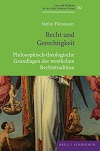 |
Stefan Frederic Thönissen Recht und Gerechtigkeit Schöningh, 2022, 597 Seiten, Hardcover, 978-3-506-79541-0 149,00 EUR |
Law and Religion in
the Early Modern Period / Recht und Religion in der Frühen Neuzeit
Band 2 Philosophisch-theologische Grundlagen der westlichen Rechtstradition Stefan Thönissen geht den philosophisch-theologischen Wurzeln der westlichen Rechtstradition nach und legt dar, wie Theologie und Philosophie Grundlagen der rechtlichen Moderne gelegt haben.In den vergangenen Jahrzehnten ist die philosophisch-theologische Beschäftigung mit dem Recht im Mittelalter und der Frühen Neuzeit immer mehr in den Fokus der Wissenschaft gelangt. Stefan Thönissen stellt diese Zusammenhänge in einem Überblick dar und fragt, wie das Zusammenwirken von Theologie, Philosophie und Rechtswissenschaft das Recht transformieren konnte. Hierfür werden zentrale philosophisch-theologische Debatten rekonstruiert und aufgezeigt, wie diese für rechtliche Diskussionen relevant wurden. Während zunächst die Theologie verrechtlicht wird, greift später eine Rezeption der theologischen Rechtslehre in den Bereich des Rechts Platz. Diese Entwicklungen machen begreiflich, wie sich der moderne, auf Person, Wille und Freiheit basierende Rechtsbegriff Bahn brechen konnte. Blick ins Buch |
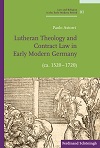 |
Paolo Astorri Lutheran Theology and Contract Law in Early Modern Germany (ca. 1520-1720) Schöningh, 2019, 657 Seiten, Hardcover, 978-3-506-70150-3 134,00 EUR |
Law and Religion in
the Early Modern Period / Recht und Religion in der Frühen Neuzeit
Band 1 English: It is clear that the Lutheran Reformation greatly contributed to changes in theological and legal ideas – but what was the extent of its impact on the field of contract law? Legal historians have extensively studied the contract doctrines developed by Roman Catholic theologians and canonists; however, they have largely neglected Martin Luther, Philip Melanchthon, Johann Aepinus, Martin Chemnitz, Friedrich Balduin and many other reformers. This book focuses on those neglected voices of the Reformation, exploring their role in the history of contract law. These men mapped out general principles to counter commercial fraud and dictated norms to regulate standard economic transactions. The most learned jurists, such as Matthias Coler, Peter Heige, Benedict Carpzov, and Samuel Stryk, among others, studied these theological teachings and implemented them in legal tenets. Theologians and jurists thus cooperated in resolving contract law problems, especially those concerning interest and usury. Blick ins Buch |